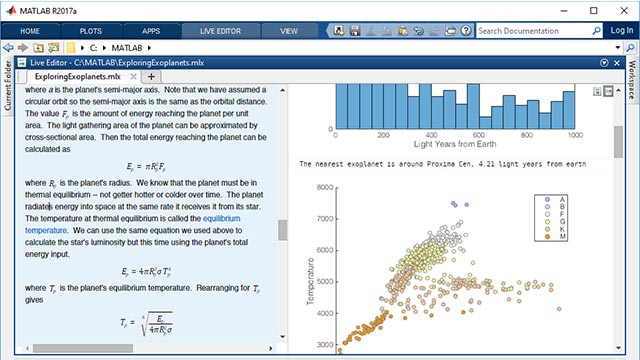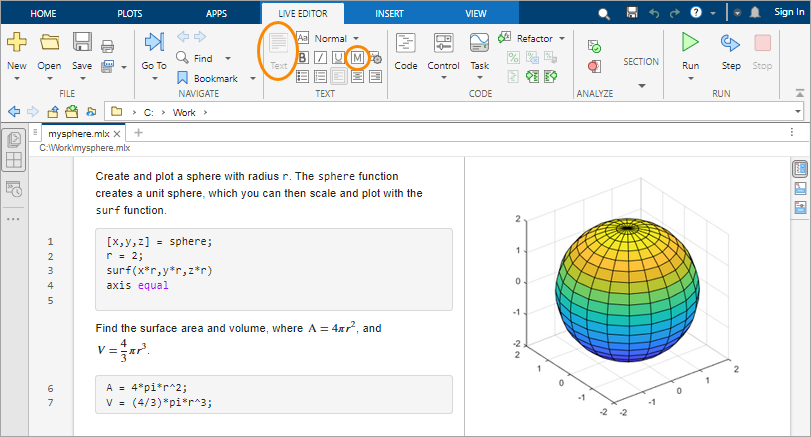Welcome to the gateway page for the MATLAB portion of Math 20D! This part of the course is an introduction to the use of computer software to solve ordinary differential equations. The labs are meant not only to teach you how to use the software but also to help you see how the underlying algorithms actually work. The material also aims to give additional perspective to topics covered in the lecture, and it presents a few real-world applications that you might end up encountering in your major.
Matlab Simulink Download
Due to the COVID-19 pandemic, the computer labs in AP&M are no longer available.You may install MATLAB on your own computer for free following instructions here. We recommend this.More detailed information can be found at Working from Home on the sidebar.

A software package used to perform a range of specific technical computing tasks, including matrix manipulations, plotting of functions and data, implementation of algorithms, and the creation of user interfaces. Tufts University offers a campus-wide license to MATLAB, Simulink, and a full suite of companion products. All faculty, researchers, and students are eligible to download and install. MATLAB is a high-level technical computing language and interactive environment for algorithm development, data visualization, data analysis, and numeric computation. MATLAB is a programming language developed by MathWorks. It started out as a matrix programming language where linear algebra programming was simple. It can be run both under interactive sessions and as a batch job. This tutorial gives you aggressively a gentle introduction of MATLAB programming language. It is designed to give students fluency.
If you don't have a computer, there is an option to request a loaner laptop here. MATLAB online works well if you use a Chromebook or you simply don't want to install MATLAB. You can use it for free once you create a MathWorks Account using your @ucsd.edu email address.If you don't have a computer but you have a tablet like an iPad,you can use MATLAB Mobile with a MathWorks Account. For the options above, you need to manage some M-files starting in the second assignment.CloudLabs also works and instructions arehere. Beware it can be quite slow but you don't need to manage those M-files. Note that you need to connect via UCSD VPN to use CloudLabs.
In general, each lab is self-contained and can be completed without prior MATLAB experience, although some assignments depend on commands learned in earlier labs.
MathWorks is an American privately held corporation that specializes in mathematical computing software.Its major products include MATLAB and Simulink, which support data analysis and simulation.
| Assignments | 1. Introduction to MATLAB | Due at 1pm on April 16 PDT |
| 2. Visualizing Solutions to ODEs | Due at 1pm on April 30 PDT | |
| 3. Numerical Methods | Due at 1pm on May 14 PDT | |
| 4. Systems of ODEs | Due at 1pm on May 28 PDT |
The due dates above are the standard dates for all 20D courses, but please note that your instructor may assign different dates, in which case his or her assigned dates take precedence. Please check your class's website to verify due dates.
Homework should be uploaded to Gradescope by 1 pm PDT on the listed due dates. (See the instructions within Assignment 1 for more information.) Be careful to pace yourself with the rest of the course; if you see a midterm coming up near a MATLAB due date, it is to your advantage to do your homework early.
MATLAB Tutoring

MATLAB tutors are available to provide help with MATLAB during Week 2-9; their scheduled hours are available via the link in the sidebar. Please note that there are no regular MATLAB sections and the lab hours in webreg do not mean anything. You may go to different tutors' tutoring hours via Zoom. Information about the meeting IDs will be provided on your Canvas->Annoucement.
The MATLAB Quiz
Matlab Plot
During the last week of the summer session, you will have to take a MATLAB quiz.
- You will be tested on your ability to use rudimentary MATLAB commands to solve basic computational problems and on your understanding of topics covered in the lab assignments.
- The quiz will cover Assignments 1 through 4.
- You can make use of gradescope and the course websites but no other websites.
- The quiz is scheduled for one hour, although you most likely will not need the full amount of time.
- Open book and notes. But you may not disclose the exam problems to any other person during the quiz days. Any sign of disclosure will be reported immediately to the Academic Integrity Office.
- The quiz will be offered in Quizzes on Canvas. The problems are in the forms of multiple choices, numerical answers, etc. You don't need to write/scan anything.
Quiz Time
The Math 20D quiz will be held
| 0:00 am PDT on Wednesday June 2 until 11:59 pm PDT on Thursday June 3 in Week 10 |
| in 'Quizzes' section on Canvas. |
You can take it whenever the time is convenient for you during the period. The quiz starts the first time you access the quiz and ends after 60 minutes.
We do not offer make-up quizzes if you miss your quiz.
Feedback
If you have any suggestions or comments about the lab assignments, we'd love to hear from you. Also, if you encounter any mistakes or broken links, let us know. Send an email to the Senior MATLAB TA. Please include in the email your class information like the lecture code or your instructor.Also, note that the MATLAB TA only coordinates the MATLAB part. You should ask your regular TAs questions about regular lecture material.
Matlab Free Student
References
Books:
- Boyce, William E. and Richard C. DiPrima. ElementaryDifferential Equations and Boundary Value Problems. 8th ed.Hoboken, NJ: John Wiley & Sons, Inc., 2005.
This is the textbook for most of the Math 20D course. - Kreysig, Erwin. Advanced Engineering Mathematics. 7th ed.New York: John Wiley & Sons, Inc., 1993.
This book explains many of the applications of differential equationsto science and engineering. - Stewart, James. Calculus - Early Transcendentals. 5th ed.Pacific Grove, CA: Brooks/Cole, 2003.
This is also a textbook for Math 20D, covering the first few weeks ofthe course.
Web Sites:
- Wikipedia
An excellent resource for articles on mathematical topics. - The Millenium Problems
The Clay Mathematics Institute has offered a million dollar prize forthe solution of a variety of open problems in mathematics. One suchproblem involves solving the Navier-Stokes equations, which are a setof differential equations. - MacTutor Archive
The MacTutor History of Mathematics Archive is a comprehensivereference for information about mathematicians and the history ofmathematics. Biographies of mathematicians mentioned in theseassignments are found on this site. - BCIT Math Applications
This site is a great resource for finding applications of math to thereal world. - MathWorks
MathWorks is the creator of MATLAB. Product information and helpcan be found here. - UCSD Math
This is the home page for the UCSD Department of Mathematics. - UCSD ETS
This is the ETS (Educational Technology Services) home page, containingresources for computing at UCSD.
Matlab Fft
Acknowledgments
| Faculty Coordinator | Professor Bo Li |
| Graduate Student Coordinator | Zilu Ma |
| Recent Faculty Coordinators | Professor Leok Professor Helton |
| Previous Faculty Coordinators | Professor Bunch Professor Driver Professor Eggers Professor Holst Professor Li |
| Previous Graduate Student Coordinators | Jay Cummings Liz Fenwick John Geller James Hall Dan Hoff Derek Newland Håkan Nordgren Jacek Nowacki Sean Raleigh Alon Regev Timothy Swec |
- Deliver and maintain services, like tracking outages and protecting against spam, fraud, and abuse
- Measure audience engagement and site statistics to understand how our services are used
- Improve the quality of our services and develop new ones
- Deliver and measure the effectiveness of ads
- Show personalized content, depending on your settings
- Show personalized or generic ads, depending on your settings, on Google and across the web
Matlab Matrix Solver
Click “Customize” to review options, including controls to reject the use of cookies for personalization and information about browser-level controls to reject some or all cookies for other uses. You can also visit g.co/privacytools anytime.
